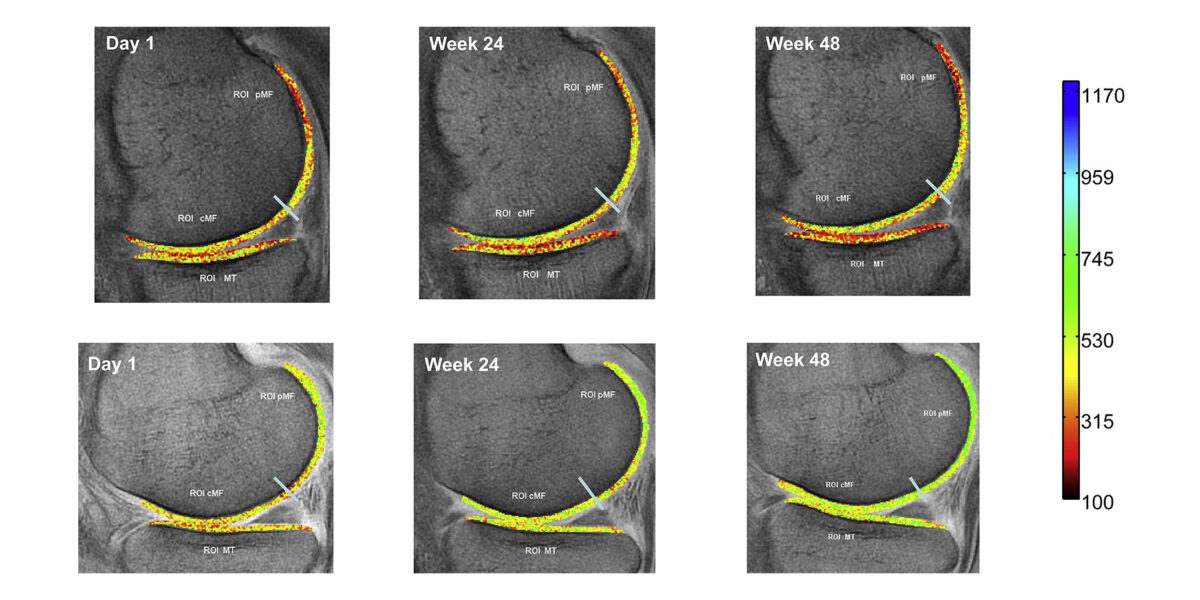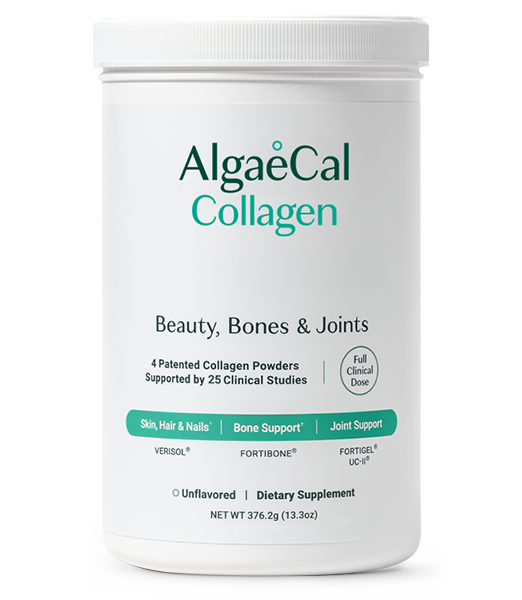Do you feel your joints protesting when you climb out of bed, bend to tie your shoes, or kneel to join your grandkids in their games? You’re not alone. Each year, joint pain impacts countless Americans.1 And it’s mainly caused by the erosion of joint cartilage due to factors like aging, intense exercise, and joint overload.
In this article, we will examine how a lack of collagen might be the root cause of this cartilage erosion. We’ll also reveal the best collagen to take to repair cartilage and relieve achy joints – including the scientific research behind it.
The Role of Collagen in Your Joints
Think of collagen as the glue that holds your body together. It offers structure and support to all your connective tissues, including your skin, bones, ligaments, tendons, and – most importantly – the cartilage that protects your joints.2
In your knees, this cartilage ranges in thickness from 1.69 to 2.55 mm,3 which is roughly 2 to 3 times the thickness of a standard credit card. This layer of cartilage plays a crucial role in the smooth and efficient functioning of your knee joint:
Shock Absorption: Cartilage acts as a shock absorber, cushioning the knee joint during activities like walking, running, and jumping, thereby protecting the bones from impact.
Smooth Movement: The cartilage provides a smooth, slippery surface that enables the bones of the knee joint to glide effortlessly over each other with minimal friction during movement.
Joint Stability: By fitting snugly into the contours of the bones, cartilage helps to stabilize and support the knee joint, ensuring it moves correctly and efficiently.
Load Distribution: It helps in evenly distributing the load and stress across the knee joint during weight-bearing activities, which prevents excessive wear on any one part of the joint.

Healthy knee cartilage is essential for maintaining mobility, flexibility, and joint health. As your cartilage wears down, you may experience joint pain, stiffness, clicking, creaking, locking, and swelling.
Aging Hurts. But It Doesn’t Have To!
When you’re young, your joints are smooth and pain-free because you have plenty of collagen, keeping your cartilage thick and strong. But as you hit your late 20s, collagen production starts to slow. And by the time you celebrate your 40th birthday you’re losing around 1% of your collagen annually. Now, a 1% loss might not sound like much. But the compounding effects of this annual loss really add up – and by the time you’re 60, you’ve lost 50% of your collagen…
That means your cartilage gets thinner and thinner every year, and that’s why you end up with joint problems.
So, it’s important to replace the collagen in your body. Foods like bone broth and gelatin are great sources of collagen, and other foods rich in Vitamin C, copper, and zinc help your body produce and synthesize collagen. And while those are great, it’s a good idea to supplement your collagen intake—after all, it’s not always convenient to have a pan of bone broth simmering in your kitchen!
Which Collagen Supplement Is Best For Joint Health?
Since collagen plays such a pivotal role in your joint health, it’s important to choose the right one. But with hundreds of collagen supplements on the market, how do you know which one to choose?
You walk into your health food store looking for something to ease your joint pain, and you’re met with a bewildering array of options. Do you go for Type I, II, or III? Should it be hydrolyzed, peptides or undenatured? And what about sources? Do you need bovine, fish, or chicken? How do you know… really know… which of these collagens will work!
This is your health we’re talking about! So you shouldn’t have to guess.
Another problem with most collagens is that they can taste awful and are annoyingly clumpy. No matter how you stir, shake, or blend them, they either gloop up or totally throw off the taste of your morning coffee or smoothie.
Plus, you may have noticed they can be rough on your stomach and leave you with a ‘heavy’ bloated feeling.
So when shopping for a collagen supplement, there are three things you’ll want to look for:
1. Clinically Supported Ingredients
You don’t want collagen. You want clinically supported collagen. Specifically, you want a Type II collagen that’s backed by rigorous scientific studies to regrow knee cartilage and improve the range of motion in your knee joint.
2. Clinically Backed Doses
Some collagen supplements might have the right ingredients but the wrong dose! If research suggests you need 5g of collagen for joint relief, but your supplement provides only 1.2g, it won’t be effective. You’re not getting the necessary dose, so you’re essentially throwing money away.
3. Soluble, Palatable, & Digestible
The best self-care routines are the ones that you can easily stick to. That’s why it’s important to choose a collagen powder that dissolves easily, has no taste, and is gentle on your digestive system to ensure you can maintain your routine.
When it comes to collagen for your joints, two collagen powders stand out – Fortigel® and UCII®. These are both patented collagens that are backed by dozens of scientific studies.
The Scientific Studies Behind Fortigel®
Regrows Cartilage
A 2011 study by Tufts Medical Center and Harvard University examined the long-term impact of Fortigel® on early-stage knee osteoarthritis sufferers. The study divided 30 participants into two groups: one received a daily dose of 10 grams of Fortigel® for 48 weeks, and the other was given a placebo.
MRI scans were taken at the start, halfway through, and at the end of the study period. Remarkably, those taking fortigel® saw an 8% increase in knee cartilage density after 48 weeks, a significant improvement over the placebo group.4 You can see the medical images from the study below, illustrating the positive changes.

These results indicate that Fortigel® can help regrow joint cartilage in the knee. This is extremely promising for anyone experiencing wear and tear in their joints from overexercise/overuse, injury, or aging.
Reduces Joint Pain
A 2008 study at Penn State University recruited 147 athletes who were experiencing activity-related joint pain.5 The athletes were split into two groups for the study: one received a daily dose of 10 grams of Fortigel®, while the other was given a placebo, over a period of 24 weeks. To assess the severity of their symptoms, both the attending physician and the participants themselves used a 1 to 10 scale, where 1 represented the absence of symptoms and 10 indicated extremely severe symptoms.

Those who took Fortigel® reported feeling less joint pain.
In a 2021 study at the University of Freiburg, researchers discovered that taking just 5g Fortigel® significantly eased joint pain related to physical activity. They invited 180 active young people, all dealing with knee pain during sports, to participate in their study.
The participants were randomly assigned into two groups. One group received Fortigel®, while the other group got a placebo. After three months, they evaluated everyone’s knee pain. The result? The participants who had taken Fortigel® reported less pain during sports than those who got the placebo. This greatly reduced the need for over-the-counter pain relievers, ice packs, gels, and trips to the physiotherapist.
The study showed that Fortigel® had a positive effect on knee joint pain—particularly during activity. In fact, participants saw a 38% reduction in “pain during activity” after taking Fortigel® compared to the placebo group.
The Scientific Studies Behind UCII®
Makes Joints Feel Younger
Over time, people tend to lose a bit of the flexibility in their knees – about 1 degree per decade on average. But, a 2022 study found that UC-II® collagen can significantly change that.6
In this double-blind, randomized, placebo-controlled human clinical trial, 96 active, healthy male and female volunteers between the ages of 20 and 55 were randomized to a control group or a group which took 40 mg of UC-II daily for six months. During that time, the researchers evaluated joint flexibility, joint discomfort, and daily step count.
One paper focused on metrics of knee flexibility, while the other focused on joint discomfort.
Knee Flexibility
In the study, the group taking UCII® saw knee flexibility improve 15 times more than those taking the placebo. Specifically, the UCII® group gained an average of 3.23 degrees in knee flexibility. This improvement is like reversing joint age by over a decade.
Knee Comfort
Participants taking 40 mg of UC-II® collagen for 24 weeks experienced a notable reduction in knee pain during activities like twisting, walking downstairs, and on flat surfaces, and saw a decrease in joint discomfort post-activity, particularly those aged 20-35.7
Impressively, those on UC-II® collagen walked an extra 747 steps daily. This study underscores UC-II® collagen’s ability to not only make walking more comfortable but also to help individuals easily achieve their daily step goals, promoting a more active and comfortable lifestyle.

Takeaway
Fortigel® and UCII® are clinically supported collagens. A wide portfolio of studies proves these collagens can regrow cartilage, reduce pain, and improve flexibility in the knee. So you can see why we included BOTH these collagens – in full clinical doses – in AlgaeCal’s Collagen.
That’s right! We launched our very own collagen supplement. We’re calling it AlgaeCal Collagen. It also contains full clinical doses of Verisol® Collagen – clinically supported to reduce wrinkles, strengthen nails, and thicken hair. And Fortibone® Collagen – clinically supported to increase bone density.
Together these 4 clinically supported collagens can help you look and feel up to 10 years younger. We’ve already started taking this whole-body collagen at the office, and so far we’re feeling GREAT about the results.
Can Collagen Help with Joint Pain and Knee Pain?
Collagen plays a crucial role in cartilage, which acts as a cushion for joints. Research indicates that taking collagen supplements may help alleviate joint pain and enhance mobility by aiding in cartilage repair and lowering inflammation.
What Type of Collagen Is Best for Joint Health?
Type II collagen is especially advantageous for joint health since it is the main component of cartilage. Hydrolyzed collagen peptides (Types I and III) can also contribute to the overall health of connective tissues.
How Long Does It Take for Collagen to Work for Joint Pain?
Research suggests that significant improvements in joint pain and function can be observed within 8 to 12 weeks of regular collagen supplementation.
Does Collagen Help with Osteoarthritis?
Yes, studies indicate that collagen supplementation can alleviate symptoms of osteoarthritis by enhancing cartilage integrity and reducing joint stiffness.
How Much Collagen Should I Take for Joint Health?
Research recommends a daily intake of 10 grams of hydrolyzed collagen to effectively support joint health and minimize pain. It’s always best to consult your healthcare provider for tailored advice.






Nina Harris
June 7, 2024 , 5:51 amHi
I’m eating a whole foods, plant-based diet since being diagnosed with cancer. This means I can’t take collagen, as it comes f on animals.
Is there a vegan supplement that will trigger cartilage growth?
thank you
Nina